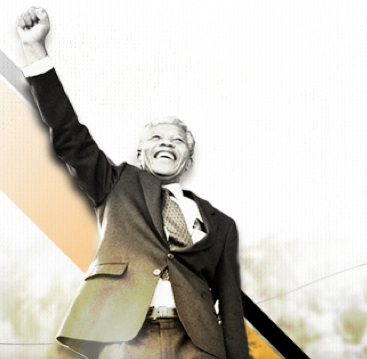From the 1960s, when he was a political prisoner and South Africa was under the laws of apartheid, right up to his death on Thursday, when apartheid had fallen and he was among the world's most admired people. Mandela inspired concerts, songs, poems, fiction and movies. Those honoring him include Academy Award winners Sidney Poitier and Morgan Freeman, Grammy winners Stevie Wonder and Whitney Houston and Nobel laureate Nadine Gordimer, a South African novelist.
Artists were equally drawn to the man and to what he stood for. Poitier, gifted at conveying fiery resilience and good-natured restraint, was an obvious choice to portray him for a TV movie in the 1997. Freeman, an actor of such august bearing that his roles have ranged from judges to God, played Mandela in "Invictus," about a South African rugby team.
During the quarter century Mandela was jailed, his freedom became synonymous with the freedom of his country. Songwriters and poets invoked his name in calling for apartheid's end. Elizabeth Alexander, who read the inaugural poem at the swearing-in of President Obama in 2009, had years earlier written "A Poem for Nelson Mandela," which featured the lines "Nelson Mandela is with me because I believe/in symbols; symbols bear power; symbols demand/power; and that is how a nation/follows a man who leads from prison/and cannot speak to them."
It took some daring to support Mandela during his prison years, when Mandela and the political movement he led, the African National Congress, were on international terrorist lists and opinions about him often divided between liberals and conservatives. As late as 1988, just two years before his release, an all-star concert held to celebrate his 70th birthday was censored on television to remove political content.
But just as South Africa managed a peaceful transition from apartheid to democracy, Mandela evolved from opposition leader to head of state to sage with remarkably little damage; he only seemed to gain admirers. "Nelson Mandela is, for me, the single statesman in the world," Nobel laureate Toni Morrison once observed. "The single statesman, in that literal sense, who is not solving all his problems with guns. It's truly unbelievable." Over the last decade of his life,Mandela presided over a series of "46664" concerts in South Africa, named forMandela's prison number (466) and the year he was jailed, 1964.
MOVIES: Some of Hollywood's greatest actors played him on film, notably Freeman in the 2009 release "Invictus," directed by Clint Eastwood. Poitier and Danny Glover each starred in TV movies about Mandela's life and Mandela himself made a cameo at the end of Spike Lee's "Malcolm X," released in 1992. "Mandela: Long Walk to Freedom," starring Idris Elba and based on Mandela's autobiography, has just been released.
CONCERTS: One of the landmarks of the movement to free Mandela was a 1988 televised concert from London's Wembley Stadium that celebrated his 70th birthday and featured such superstars as Wonder, Houston and Sting. At the time,Mandela's African National Congress was still regarded as a terrorist organization by many countries and had been condemned by Britain's then-Prime Minister Margaret Thatcher. The BBC angered Mandela supporters by censoring political statements and angered the South African government by airing the concert at all.
A 1990 concert celebrating his release featured Tracy Chapman, Neil Young andMandela himself, who received a long standing ovation. Shows in his honor continued over the decades, with Will Smith, U2's Bono and Annie Lennox among those appearing.
SONGS: Songs protesting apartheid and praising Mandela were written throughout the 1980s and up through his release from prison in 1990, from Eddy Grant's "Gimme Hope Jo'Anna" to Steve Van Zandt's all-star "Sun City," featuring Bruce Springsteen, Miles Davis and many other performers. Songs directly about Mandelaincluded a Bono-Joe Strummer collaboration, "46664": "Free Nelson Mandela," by Special A.K.A., an off-shoot of the Specials, and Simple Minds' "Mandela Day."
LITERATURE: Gordimer's 1987 novel "A Sport of Nature" prophesized the end of apartheid and included a liberation leader based on Mandela. Poems about Mandeladate back at least to the 1970s with "And I Watch it in Mandela," by South Africa's John Matshikiza. Jekwu Ikeme's "When Mandela Goes," published in 2004, bowed to mortality and looked to a future without the hallowed man whose tribal name was Madiba.
When you go Madiba your nobility shall be our lasting inheritance
this land you so love shall continue to love
we shall trail the long and majestic walk
your gallant walk shall be our cross and shepherd.
